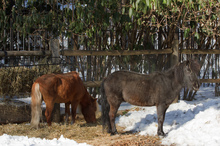Pasture management in the fall can have a big impact on the success of your pastures next spring. Heavy overgrazing of pastures can negatively influence stored root food reserves and contribute to poor winter survival.

Making winter months better for horses and pastures
Effective pasture and horse management in the fall can have a big impact on the success of your pastures next spring and through the winter months.
For most pastures, six weeks are needed for forages to regrow and store the necessary food reserves for winter survival in areas where a hard freeze can kill the shoots and stop food root reserve accumulation.
If you have a pasture that is over-grazed, rest it for the remainder of the year. This will give the grass a chance to store up nutrients for next year, so the pasture will be healthier in the spring.
Keeping horses on the same pasture over winter causes damage to plants. So, it's best to keep horses in a sacrifice lot where they have access to hay, water and shelter.
According to agricultural experts at Penn State Extension, August 15th to September 15th are the best time of year to seed or reseed pastures because there is usually adequate moisture, less weed competition, and cool, desirable weather conditions.
However, if you did not reseed during early fall, frost seeding or inter-seeding pastures in early spring will work if you start your plans now. Common grass species used are Timothy, Orchard Grass, and Smooth Brome. Turf-type lawn grasses like Kentucky bluegrass can be used for higher traffic areas and serve as a good base for your pasture.
7 tips for pasture and horse management going into winter:
1. Test your soil
Take the guess work out of planting by getting your soil tested to see if your pastures need any nutrients. Anytime from now until the ground freezes is a good time to take samples because the soils are drier and easy to sample. Contact your local county Extension office for information about soil testing.
2. Fertilize
Use compost or a commercial fertilizer and drag manure piles in your pasture. As stated above, test your soils first so you know how much you need. Often, only nitrogen is needed in pastures since manure provides quite a bit of phosphorus and potassium. Our soils tend to require lime to increase the PH check your soil test for lime requirements.
3. Control weeds
To control perennial weeds with an herbicide, fall is the time. Perennial plants are storing nutrients for winter in their roots. As the nutrients go into the roots, so will the herbicide, giving the best change for a successful kill.
It is best to have mowed the perennials though out the summer so they are not so mature. Herbicides usually work best on re-growth or plants that are 4-8 in height.
4. Follow a manure management plan and dispose of manure
If you are going to fertilize your pastures with manure, sample the manure first so you know how much you should spread. Only spread manure on your pastures if you have somewhere else to move the horses. Remember, spreading additional manure on your pasture can result in greater chances of parasite exposure.
5. Check all fences
Make sure all fences are in good shape before the wind and snow flies. Pay special attention to temporary electric fence (ribbons, wires and string) and replace any broken posts before they are frozen into the ground then they cannot be fixed.
6. Take horses off pastures during early frosts
Frosted grass can cause digestive up-sets to horses. In addition, hoof traffic after a frost can damage grasses. Make sure the sacrifice lot areas set up for the horses, to hold them until the grass thaws for the day.
7. Check hay, feed and bedding storage
Make sure your storage areas are free from leaks and rodents. Try and have supplies in storage before the heavy snows make it difficult to deliver supplies.
